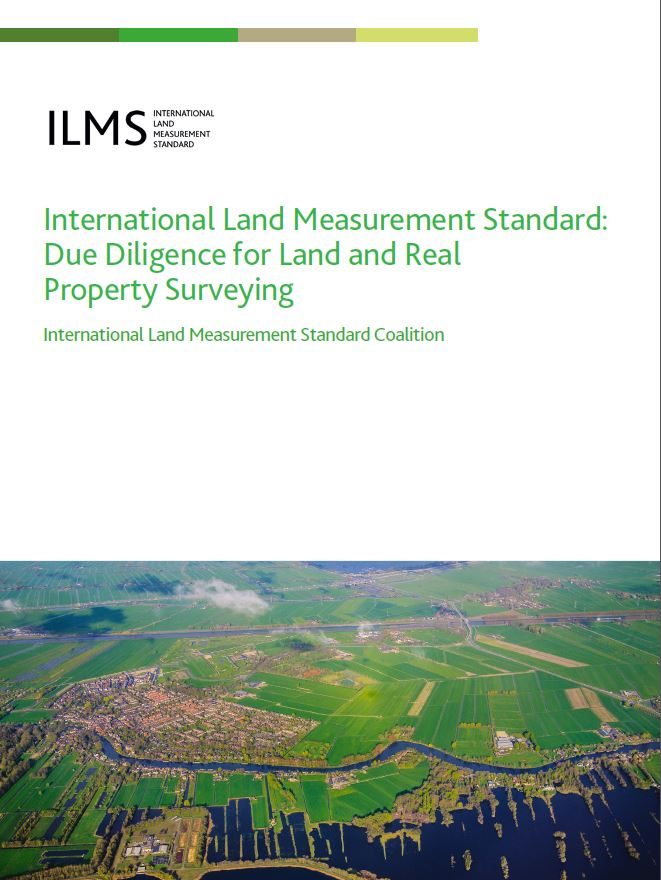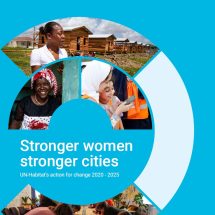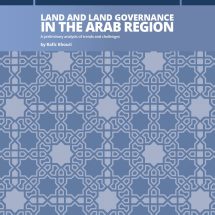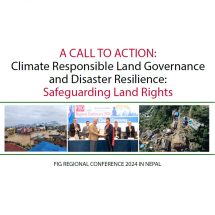New publication outlining ILMS due diligence for surveyors (advising on acquisition of land, real estate and natural resources)
The International Land Measurement Standard (ILMS) https://ilmsc.org/ is an international principle-based standard for recording and reporting information and material relevant to land and property transfers.
ILMS has been developed by a global coalition of nearly 40 professional surveying bodies and is the result of nearly 3 years of negotiation, technical drafting and international collaboration.
Land is a vital and limited national resource. Yet in many countries there is currently a lack of transparency both in land rights and land interests. The lack of transparency often becomes more apparent during the land transfer process.
In many developing and developed countries, large tracts of land are held on an informal and/or communal basis. This may result in people living with insecure tenure and the effects of opaque interests. This can make it extremely difficult to achieve the UN Sustainable Development Goals (SDGs) that support good land administration. (The UN SDGs are included in Appendix A of ILMS.)
ILMS is a due diligence framework and standard for land and real property surveying that supports a sustainable future both for people and legal entities. ILMS is both a standard and a due diligence framework to enable evidence-based assessment of land and property and is designed to address the current lack of transparency in land rights and land interests. ILMS recognises gender equality and pro-poor issues when gathering field information on legitimate land ownership and is also deeply connected and complimentary to other globally relevant standard and frameworks in the land acquisition and transaction space.
These include other global ‘land’ outputs such as LADM (Land Administration Domain Model), UNFAO voluntary guidelines (VGGT), UN GGIM land administration working group, OGC land administration model, RICS and GLTN outputs on valuation of unregistered land and the recently released UN FAO Due Diligence for lawyers working in land acquisition and transfer. There are many ‘actors’ within the land acquisition process and both the UNFAO and ILMS due diligence standards help to create a stable and transparent model for practice. ILMS is focussed on ‘on the ground’ land activities and so provides a critical land information link back to governance and legal due diligence frameworks.
ILMS is divided into five parts. The introduction details the standard’s development and the drive behind it. Part 2 provides additional context around land information systems, the application of the standard and links with other international standards. Parts 3 and 4 cover the components that make up the due diligence framework and give examples of how this may be completed in both data rich and data poor environments. Key terms are then defined in part 5.
ILMS is flexible and can be adopted incrementally and/or partially in line with the sustainable fit-for purpose principles such as those being globally adopted in land administration. It will also advance best practice. Beyond due diligence, ILMS takes account of existing rights such as communal rights, tribal rights and gender rights, and considers the hierarchy of land rights within any land parcel.
ILMS may prompt market demand for publicly accessible and transparent registers of land information. Various translations of ILMS will be available in due course.
Click here for the new publication.
For more information contact James Kavanagh: jkavanagh@rics.org
For more information about GLTN, contact Oumar Sylla: oumar.sylla@un.org












